- Home
- Joan Lowery Nixon
Nobody's There Page 2
Nobody's There Read online
Page 2
“I’m sorry,” Abbie continued. She motioned to Davy to turn down the sound of the television. “I didn’t hear you. Who did you say you were?”
The woman’s voice was steely. “Why don’t you turn off those cartoons, please?”
Abbie grabbed the remote control out of Davy’s hand and turned off the television. “I’m sorry,” she said again. “My little brother—”
“Please pay attention,” the woman said. “As I told you, my name is Judith Wilhite. I’m president of the organization Friend to Friend.”
“Oh—oh, y-yes,” Abbie stammered. She sat on the remote control and turned her back so that she didn’t have to look at the faces Davy was making at her. “I’m Abbie—uh—Abigail Th—”
“I know. My husband informed me about you and your circumstances.” Mrs. Wilhite’s words remained so clipped and cold that Abbie hunched her shoulders, her back pressing uncomfortably against her kitchen chair.
“The girls who are volunteers in our program are top students and leaders in their high schools. It’s certainly not standard rules or even good judgment to add to this outstanding group a girl who has been in criminal trouble and is on probation. However, my husband has convinced me to give you a try.”
Sick at heart, Abbie struggled to keep her mind on what Mrs. Wilhite was saying. Criminal trouble? A girl on probation? The label made Abbie feel like some terrible kind of lowlife.
“Gimme!” Davy said, and held out his hand for the remote control.
Mrs. Wilhite told Abbie that a package of information had been sent by messenger to her home. “Please read all the rules carefully. If there are any questions, just telephone our secretary’s number on the first sheet of the booklet. I believe you agreed to pay an afternoon call today on the woman who’ll be assigned to you?”
“Yes, ma’am,” Abbie answered.
“Very well,” Mrs. Wilhite said. “I hope there won’t be any problems.”
“No, there won’t,” Abbie said, but Mrs. Wilhite had already hung up the phone.
“Before Mom went to her office, she said I could watch Saturday-morning cartoons!” Davy yelled at Abbie. “Gimme back the control.”
Abbie sighed and handed Davy the remote control. He didn’t used to be so argumentative. He’d always been a happy kid, and they’d had fun together. Now he was angry most of the time. He hadn’t heard Dad’s parting words, as Abbie had, but it didn’t matter. Davy must still feel as rejected as Abbie did.
“That was an important phone call,” she tried to explain. “It was all about something I have to do to make up for what happened last night.”
Davy clutched the remote control, but he didn’t turn on the television. He cocked his head, studying Abbie with curiosity. “You threw rocks at Dad and his girlfriend,” he said. “I heard some of what Mom said to Mrs. Erwin.”
“I didn’t throw rocks at anybody,” Abbie told him. “Dad and … that woman had already driven off. I threw them at the front window of her apartment. I didn’t know she had a roommate and she’d be there.”
Davy smiled. “I wish I’d seen that. I wish I’d seen the police come. Did they have their sirens on?”
Abbie groaned. “I shouldn’t have done it, Davy. I was angry. I wasn’t thinking. No matter how I felt about what Dad was doing, I shouldn’t have thrown the rocks. Do you understand that what I did was wrong, and now I have to make up for it?”
“They didn’t put you in jail.”
“No, but I’m on probation. The judge gave me a job to do. That’s what the phone call was all about. Do you want me to tell you more?”
“No,” Davy said. He held out the remote control toward the television set and turned his back on Abbie.
Before the package arrived, Abbie put the dishes in the dishwasher, changed the sheets on the beds, added some towels to the laundry, and put the first load into the washer. Then just as ordered, she sat down and read everything in the large envelope. The printed flyers and letter told her the same things the judge had said, but they also gave her a name, phone number, and address.
The telephone rang again, and Abbie grabbed it before Davy could get to it.
A familiar voice said, “Hi, Abbie. Want to go to the mall this afternoon?”
Abbie leaned into the warmth of Gigi’s best-friendship, pulling it around her shoulders, clinging to its support. “I can’t,” she answered. “Today I have to visit the woman I was assigned to.”
Abbie explained about the Friend to Friend program. “Mrs. Wilhite made it clear I wouldn’t fit in with the other girls in the program. They’re all straight-A students, at the tops of their classes.” She smiled as she added, “Like you.”
“I know about the program,” Gigi said. “Wendy Banes is in it. So is Judy Hanks.” Then she added, “Tell me, what is your assignment like? How old is she? Do you have to spoon-feed her or anything like that?”
Abbie laughed. Gigi always had a way of making her feel better, no matter what the problem. Gigi had immediately understood how Abbie felt about her father; and the night before, when Abbie had told Gigi about why she’d been arrested, Gigi had insisted that she not blame herself, that anyone would have done the exact same thing.
“I can’t answer your questions, because I haven’t met the woman yet,” Abbie said.
“Do you know her name?”
“Edna Merkel, 6615 Darnell Street,” Abbie read aloud, and sighed. “I have no idea what she’s like.”
“I know,” Gigi said. “I can picture her in my mind. She’s way overweight, with thin white hair and thick ankles, and she’s probably at least a hundred years old. She nibbles on chocolates and giggles when she talks and wears some kind of sweet perfume that smells like marshmallows.”
Abbie laughed again. “Right. And her dresses are printed cotton housedresses, which she saved from the forties.”
“And tidy little hats.”
“With veils and one red rose.”
“No. One yellow sunflower.”
Abbie and Gigi both broke into laughter. As soon as they calmed down, Gigi said, “Call me when you get back from visiting her and tell me everything. Okay?”
“Will do,” Abbie said. “I gotta go now. I’ll talk to you later.”
As she hung up the telephone, Abbie’s good mood vanished. She would soon meet Edna Merkel, and for better or worse she was stuck with her.
“I can’t take it,” Abbie murmured, but as soon as her Saturday-morning chores were finished and her mother had returned from her half-day at work, Abbie borrowed the car and drove to Edna Merkel’s house on Darnell.
It was a small two-story brick building on a street of similar houses, built so near the gulf that the air carried a clinging fragrance of salt and seaweed. Abbie guessed that the houses in Mrs. Merkel’s neighborhood had all been built at the same time, probably way back in the thirties, or even the twenties.
Six steps led up to a deep, covered front porch that extended across the front of Edna Merkel’s house. Although the day was flooded with sunshine, thick vines of Confederate jasmine twined up the pillars and dripped over the roof, creating a dim, cool cavern.
Abbie pushed the doorbell and heard it chime off key, but no one came to the door. Impatiently Abbie jabbed the doorbell again.
Suddenly the dark-stained front door slowly opened an inch. “Get off my porch,” a voice rasped.
Startled, Abbie jumped back. Then she remembered why she had come and knew that she had to be there. She peered into the darkness behind the open crack in the door but couldn’t see a face she could talk to. “Mrs. Merkel, I’m Abbie Thompson,” she said. “I was sent here by the president of Friend to Friend.”
“I’m going to count to three,” the voice said.
“I’m supposed to telephone you and visit you and drive you to places you want to go and—”
“And then I shoot. One … two …”
Abbie whirled and ran down the steps of the porch.
Panting with fear, A
bbie raced as far as the sidewalk.
“Wait a minute!” Mrs. Merkel shouted in a voice so strident and raspy that Abbie winced. “Did you say you’d drive me where I want to go? Like at two o’clock today?”
Abbie turned back, shakily retracing a few steps toward the house.
“Well? Speak up.”
Framed in the open doorway stood a tall, bony woman with gray hair pulled tightly away from her face and tied at the nape of her neck with a string. She was dressed in an odd combination of an oversized, faded green T-shirt advertising a celebrity golf classic and a lined, flowered chiffon skirt that hung almost to her ankles. Navy blue ankle socks and smudged white tennies completed her outfit. As she waited for an answer, her heavy-lidded, dark eyes cut into Abbie like a pair of lasers. For a moment Abbie could only stare.
“Stop gawking. I’m not trying to make the cover of Vogue,” Mrs. Merkel said. “And come back here. We can’t just yell at each other.”
Abbie took a few more steps, then stopped. “I don’t want you to shoot me,” she said.
Mrs. Merkel shrugged. “Don’t be so quick to believe everything people tell you. I don’t own a gun. I just don’t like to be bothered by people I don’t know, so I scare them away.” Her eyes drilled even deeper. “Come on up here on the porch. You said you’d take me anywhere I wanted to go. Did you mean it, or was that just so much blather?”
Abbie forced herself to walk to the porch. “I meant it,” she said. She tried to keep the bitterness from her voice as she added, “The judge said I had to.”
“You had to? Well, aren’t you a polite, gracious little thing?” Mrs. Merkel stepped closer and looked Abbie up and down. “Not so little, I guess. I’m five feet eight, and you’re every inch as tall as I am.”
Abbie could feel herself blushing with embarrassment, and she hated it. She hated this horrible old woman, and she hated the judge and his wife. She took a deep breath to steady herself, then said, “I’m sorry. I meant that I was assigned to the Friend to Friend program.” Without flinching, she looked Mrs. Merkel in the eye. “I threw rocks through the window of a woman’s apartment. I was caught and given this assignment as a condition of probation. That’s the story.”
“I know the story. I know just about everything that goes on around here.” She shook her head. “So they sent you to me, did they?”
Abbie was startled when Mrs. Merkel bent over, making a strange, cackling noise in her throat. Was she choking? As she moved closer she saw that Mrs. Merkel was laughing.
“I get a lawbreaker and you get me. Fair enough trade,” she said. She motioned toward a wooden porch swing, its varnish weathered in decayed blotches. “Don’t just stand there like a ninny. Sit down.”
Abbie sat gingerly, concerned that the rusty chains that held the old swing in place might give, dropping her to the floor.
But Mrs. Merkel plopped down beside her, saying, “It’s not going to fall apart. Last time my nephew Charlie drove down from Dallas, he checked the bolts and made sure they’d hold.” Pushing off with her oversized tennis shoes, she set the swing gently in motion.
“That Friend to Friend baloney is a bunch of garbage,” she said. “The first two girls they sent me didn’t have half a brain between them, no matter that I was told they were honor students.” She studied Abbie. “Threw rocks at your dad’s girlfriend, did you? Hmmm. Is that what honor students are doing lately?”
“I didn’t throw rocks at her. I threw them at her apartment,” Abbie answered.
Mrs. Merkel grinned. “Fat lot of good it did you. I hope you figured out by this time that wasn’t very bright. Now, stop dithering around and get back to what we were talking about. Are you or are you not going to drive me wherever I want to go this afternoon?”
“I said I would.” Abbie spaced her words slowly, trying to hold her temper.
“I suppose you’d like to drive to Mexico,” Mrs. Merkel said. “A lot of criminals take off and run down there and hope they won’t get extradited back to the U.S., where they’d have to stand trial. That should be just the place for you.”
Indignantly Abbie gripped the arm of the swing. “I don’t run away from my problems,” she said.
“You can’t take a joke so good either,” Mrs. Merkel snapped. She looked at her watch. “You got any idea where the community center is? Probably not. Kids of today are so wrapped up in their own snotty little worlds, they don’t think about anybody or anything else.”
“I know where the center is,” Abbie answered. It was getting more and more difficult to talk to this crabby old woman without exploding at her.
Mrs. Merkel suddenly stood, rocking the swing and throwing Abbie off balance. “Then come on,” she said. “What are you waiting for?”
As she followed Mrs. Merkel toward the Thompsons’ car, Abbie’s anger shot like burning arrows toward Judge Wilhite’s judgmental wife. She hated her.
You set me up, Abbie accused the woman who had scorned her over the phone. You knew what Mrs. Merkel was like. You knew she had kicked out two girls before I came along. She’d kick me out too. You were sure she would. And then you could prove to your husband that he’d been wrong and you’d been right.
Abbie opened the passenger door for Mrs. Merkel, trying hard not to slam it as Mrs. Merkel settled herself on the seat with the comment, “I don’t expect you to be a good driver. Kids today are reckless hooligans on the road.”
For only a few seconds Abbie wearily leaned against the car, again directing her thoughts to a smirking Mrs. Wilhite. You just think you’re going to win this one. You’re not. I’m not going to give up this easily. I’ll stick it out with Mrs. Merkel, no matter what, and win that deferred adjudication I was promised. Just wait and see.
At the blast of the car’s horn, Abbie jumped back with a yelp. She hurried around to the driver’s side, climbed in, and fastened her seat belt. Glancing at Mrs. Merkel, she said, “Please fasten your seat belt.”
“I don’t like seat belts.”
“There’s a two-hundred-dollar fine if you don’t wear your seat belt,” Abbie persisted. “It’s the law.”
Mrs. Merkel grinned. “You’re a fine one to be quoting the law. Tell me about the law against throwing rocks.”
Abbie took a deep breath. What do I do with this woman? Do I just give up and tell Mrs. Wilhite, “You win”? Abbie looked into Mrs. Merkel’s eyes and shivered at the malice she saw there. No, she thought. I won’t give up.
Finally Mrs. Merkel snapped the seat belt in place and grumbled, “You were certainly taking your own sweet time out there. What’s the point of going to the meeting of my book club if I can’t get there when it starts?”
Abbie looked at the clock on the dashboard as she started the car and pulled into the street. “It’s barely twenty minutes to two,” she said. “You told me your meeting begins at two, and we’re only ten minutes away from the community center on Waterfront Drive.”
“Ten minutes if you speed—which you probably will.”
“Tell me about your book club,” Abbie said. She turned onto Main Street and drove a short two blocks toward Waterfront Drive, where she turned again, heading south.
Golden shimmers of sunlight rippled over the water, and out in the bay at least two dozen sail-boats skimmed the waves. March was always a beautiful month, and this day seemed one of its best.
“Watch out for that truck. Over there at the corner.”
“I see the truck.”
“There’s a man down there going to cross the street.”
“I see him.”
Mrs. Merkel took her eyes from the road long enough to examine the interior of the car. She ran her long, bony fingers over the upholstery. “This isn’t much of a car,” she said. “But then, it doesn’t make much sense to spend good money on a car for a kid, who’s only going to smash it up anyway.”
“It’s not my car,” Abbie told her. “It belongs to my mother.” Abbie realized that Mrs. Merkel was studying her from the corner
of her eye, but she refused to look at the woman. “Tell me about some of your friends in the book club,” she said.
“Friends? Huh! I wouldn’t call them friends.” Mrs. Merkel’s voice was bitter. “Lawanda and Gladys used to pick me up for meetings, but they haven’t for a long time now. Always one dumb excuse after another, until I stopped calling them. Huh!” she said again. “Who needs them?”
With Mrs. Merkel’s nonstop directions, Abbie turned into the parking lot of the community center and pulled up to the front door. “You can get out here. I’ll park the car and meet you inside,” she said.
Mrs. Merkel’s eyes narrowed. “Maybe I should stick with you—like a parole officer, or whoever you have to report to. Make sure you don’t run off and leave me while you got the chance.”
Abbie sighed, Mrs. Wilhite’s smirk in her mind. “Trust me,” she said. “I’m not going anywhere.”
“I don’t trust anybody,” Mrs. Merkel snapped, but she climbed out of the car and slammed the door.
To Abbie’s surprise, Mrs. Merkel waited for her at the door so that they could walk into the center together. With Mrs. Merkel leading, they made their way into one of the smaller meeting rooms, where a cluster of six senior citizens were informally chatting.
A hefty woman, her tight curls more gray than black, was saying, “So when she finally came to she saw right away he was dead!”
No one responded. They all turned toward the doorway staring at Mrs. Merkel.
A short, plump woman with thin white hair clasped her hands together and smiled nervously. “Oh, Edna dear, it’s you,” she said.
“As usual, you’re right on top of things, aren’t you, Gladys?” Edna’s voice was thick with sarcasm. She strode across the room to join the group. “I would have come to some of the other book club meetings if anybody had given me a ride.”

 The Internet Escapade
The Internet Escapade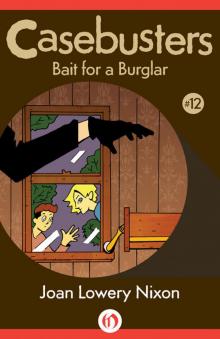 Bait for a Burglar
Bait for a Burglar A Place to Belong
A Place to Belong Nightmare
Nightmare Sabotage on the Set
Sabotage on the Set The Other Side of Dark
The Other Side of Dark Whispers from the Dead
Whispers from the Dead Secret of the Time Capsule
Secret of the Time Capsule A Dangerous Promise
A Dangerous Promise Laugh Till You Cry
Laugh Till You Cry Spirit Seeker
Spirit Seeker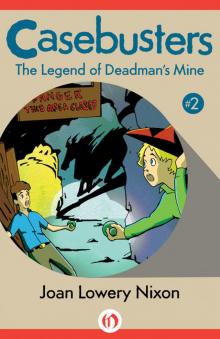 The Legend of Deadman's Mine
The Legend of Deadman's Mine Caught in the Act
Caught in the Act Check in to Danger
Check in to Danger Ellis Island: Three Novels
Ellis Island: Three Novels The Name of the Game Was Murder
The Name of the Game Was Murder The Haunting
The Haunting Lucy’s Wish
Lucy’s Wish Playing for Keeps
Playing for Keeps A Family Apart
A Family Apart Nobody's There
Nobody's There Shadowmaker
Shadowmaker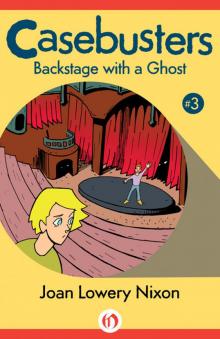 Backstage with a Ghost
Backstage with a Ghost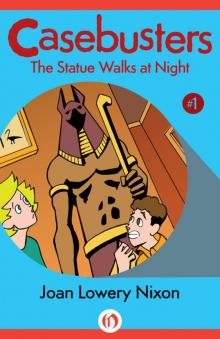 The Statue Walks at Night
The Statue Walks at Night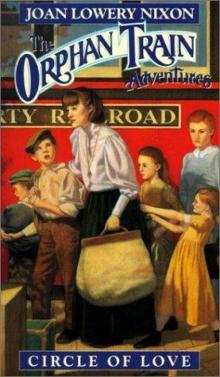 Circle of Love
Circle of Love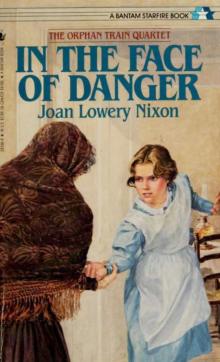 In the Face of Danger
In the Face of Danger Ghost Town
Ghost Town A Candidate for Murder
A Candidate for Murder The Weekend Was Murder
The Weekend Was Murder The Island of Dangerous Dreams
The Island of Dangerous Dreams The Ghosts of Now
The Ghosts of Now The House Has Eyes
The House Has Eyes The Dark and Deadly Pool
The Dark and Deadly Pool Keeping Secrets
Keeping Secrets Secret, Silent Screams
Secret, Silent Screams Beware the Pirate Ghost
Beware the Pirate Ghost Search for the Shadowman
Search for the Shadowman Haunted Island
Haunted Island